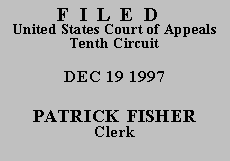

Mr. Jeys is a pro se litigator who appeals the dismissal of his complaint for
failure to state a cause of action. We review de novo a district court's dismissal
of an action for failure to state a claim and "uphold a dismissal under Fed. R.
Civ. P. 12(b)(6) only when it appears that the plaintiff can prove no set of facts
in support of the claims that would entitle him to relief, accepting the well-pleaded allegations of
the complaint as true." Yoder v. Honeywell, Inc., 104 F.3d
1215, 1224 (10th Cir.), cert. denied, 118 S. Ct. 55 (1997). As the district court's
action was correct, we affirm.
Mr. Jeys' complaint violates every known rule of pleading. We attach a
copy of pages 2 and 3 of this complaint, which provide a chart listing the "acts of
negligence and injury" of which he complains. The complaint then sets forth, as
to each of the numerous defendants, the following:
Without due process of the law, Without equal protection of the law,
Without a warrant (U.S. Const. Amend. IV), plaintiff was injured
pursuant to: Knowledge of the law (43 U.S.C. § 1986), discovery of
the law (Fed. R. Civ. P. Rule 26(e)), constructive fraud/condition of
the mind (Fed. R. Civ. P. 9 (b)), Neglect (42 U.S.C. § 1986) to
protect plaintiff's peace, dignity, constitutional and civil rights, and
the following acts of negligence and injury from the above chart
[here Mr. Jeys sets forth various numbers from his chart shown in
the attachment] By Defendant ...."
Defendants thereupon filed a written motion to dismiss the complaint for
failure to state a claim and the district court entered its order sustaining these
motions. We attach a copy of the district court's order.
Mr. Jeys appeals this order. Mr. Jeys' first asserts he was not allowed "to
conduct proper discovery and to conduct a hearing regarding respondent's claim."
He argues "Pursuant to the 'Whole Truth Disclosure Doctrine' petitioner is
entitle[d] to full disclosure." He next argues the trial court "knew that by
dismissing the petitioner's case, petitioner's right to due process would be
violated[,] ... [t]hereby causing the petitioner further injury."
Mr. Jeys' arguments are not persuasive. The trial court dismissed the
complaint for failure to state a claim. Mr. Jeys ignores his obligation to set forth
a short and plain statement of the claim showing he is entitled to relief. See Fed.
R. Civ. P. 8(a)(2). Giving Mr. Jeys' complaint the benefit of a liberal
construction, as we must, the complaint still fails to state a claim upon which
relief can be granted because it does not set forth any facts in support of its legal
conclusions. Additionally, Mr. Jeys is not entitled to discovery without first
making a proper showing he is entitled to discovery.
The order of the district court is AFFIRMED for substantially the
same
reasons as set forth therein.
Some of the Appellees have requested damages and double costs as a
sanction for a frivolous appeal. We deny these requests; however, Mr. Jeys is
advised that any further such pleadings may well result in sanctions being
imposed.
The mandate shall issue forthwith.
Entered for the Court
WADE BRORBY
United States Circuit Judge
*. This order and judgment is not binding
precedent except under the
doctrines of law of the case, res judicata and collateral estoppel. The court
generally disfavors the citation of orders and judgments; nevertheless, an order
and judgment may be cited under the terms and conditions of 10th Cir. R. 36.3.
TIMOTHY SHAWN JEYS,
Before BRORBY, EBEL and KELLY, Circuit
Judges.
After examining the briefs and appellate record, this panel has determined
unanimously that oral argument would not materially assist the determination of
this appeal. See Fed. R. App. P. 34(a); 10th Cir. R. 34.1.9. The case is therefore
ordered submitted without oral argument.
Click footnote number to return to corresponding location in the text.
![]() | Keyword |
Case |
Docket |
Date: Filed /
Added |
| Keyword |
Case |
Docket |
Date: Filed /
Added |
![]() (12106 bytes)
(12106 bytes)
![]() (8809 bytes)
(8809 bytes)
Comments to: WebMaster,
ca10 [at] washburnlaw.edu.
Updated: December 22, 1997.
HTML markup © 1997, Washburn University School of Law.
URL: http://ca10.washburnlaw.edu/cases/1997/12/97-4107.htm.